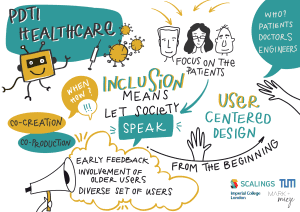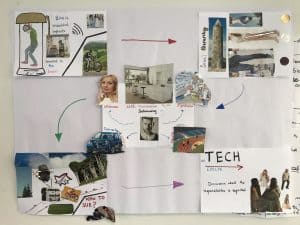Teaching
My philosophy is to teach my students both critical analysis and affirmative speculation. I believe these two skillsets need each other in order to develop reflective capacities in students. Critical analysis is about understanding and questioning the status quo while affirmative speculation aims to work with the present beyond the present. I have developed this through my longstanding teaching experience with students from disciplines such as engineering, social and neuroscience. Next to interactive formats, participatory methods, and digital tools for (online) teaching, I have used speculative design methods, science/fiction and board gaming as tools to inspire students to reimagine a more responsible future with technology. Here are three examples from courses I have taught so far:

The Co-Creation Lab was born out of the European research project SCALINGS at the Technical University of Munich in collaboration with Imperial College London in 2021. The ambition was to feed the insights from research directly into teaching. It was an exercise in co-creative education. Students worked in interdisciplinary teams on real-life cases in domains such as robotics, self-driving cars, or smart energy systems. Through reflective theory sessions and close mentoring, students were able to produce not just critical analyses but also potential pathways for fostering co-creation in the future. These suggestions were directly fed back to practitioners in the fields studied in the SCALINGS project.
Fostering co-creation and responsible innovation matters especially when technologies operate close to or inside the human body such as in the case of neuro-technology. Together with colleagues at the TUM School of Electrical and Computer Engineering I developed and conducted a practical course in Human-Centered Neuro-Engineering, where I contributed two lectures on responsible research and innovation. In this project, two teams of students from engineering, neuroscience and STS co-created a brain-computer interface and a neural prosthesis together with end users. The aim was to partake in the 2020 Cybathlon competition, which unfortunately was canceled due to the COVID pandemic. Nevertheless, the interdisciplinary and hands-on nature of the project helped students to learn about and acquire valuable experiences in the human-centred co-creation with end users.

Finally, my teaching is concerned with future-making and future-oriented responsibility. We live in times of constant speculation about the future. Futurists, scientists, and citizens partake in the constant exercise to predict, anticipate, and exploit the future. Imaginations of the future thus have a tremendous impact on how we act in the present. It makes our these imaginaries a crucial entry point for teaching students about responsibility in science, engineering, and the humanities. For this, I developed the elective course called “Prototyping Futures Through Science/Fiction” in the M.Sc. programme of Neuroengineering at the Technical University of Munich. This course combined critical thinking inspired by STS concepts and creative imagination informed by speculative design methods. Students critically analysed common tropes about neuro-technology in popular science/fiction and used the resulting insights to prototype their own, possibly more sustainable and responsible neuro-futures using techniques like collage art, board games and storytelling.
List of courses
| Course | Programme | Institution | Semester |
|---|---|---|---|
| “Co-creation lab” Practice-oriented course where students from different disciplines investigated, analysed, and evaluated real-life case studies of co-creation in the domains of robotics, energy, and mobility. | M.A. Responsibility in Science, Engineering and Technology (RESET) | Technical University of Munich Cooperation with Imperial College London | Summer 2021 |
| “Human-Centered Neuroengineering” Interdisciplinary practical course where students applied human-centered design methods to prepare for the 2021 Cybathlon competition | M.Sc. Neuroengineering (MSNE) | Technical University of Munich (cooperation between the Munich Center for Technology in Society and the Department of Electrical and Computer Engineering) | Winter 2019 - Summer 2021 |
| “What is Social about Neuroengineering?” Mandatory seminar introducing students to the social study of neuroscience and neuro-technology | M.Sc. Neuroengineering (MSNE) | Technical University of Munich | Winter 2017 - 2020 |
| “Prototyping Neuro-Futures through Science/Fiction” Elective course where students apply speculative design methods, critical thinking and creative writing to neuro-futures in science/fiction | M.Sc. Neuroengineering (MSNE) | Technical University of Munich | Summer 2017 - 2021 |
| “Literature Seminar” Seminar where students discuss and present on contemporary social, political, and ethical issues in neuroengineering | M.Sc. Neuroengineering (MSNE) | Technical University of Munich | Summer 2017 & Winter 2019 |
| “'The Practices and Politics of Science and Technology’ Tutorial” Tutorial for first year introduction to science and technology studies | M.A. Science and Technology Studies | Technical University of Munich | Winter 2016 |
| “Paradoxien der Pflege. Soziologische Perspektiven auf Verwissenschaftlichung, Rationalisierung und Technisierung” Mandatory seminar introducing students to the sociology of care reflecting especially issues of technology and rationalisation | M.Ed. Vocational Training (Sociology) | Technical University of Munich | Winter 2016 |
| “Emotionale Roboter? Neue Mensch-Maschine-Beziehungen in der Pflege” Mandatory seminar on the sociology of care robotics reflecting robotics' impact on care practices | M.Ed. Vocational Training (Sociology) | Technical University of Munich | Summer 2016 |
| “Medien als Technik / Technik als Medium” Mandatory seminar introducing students to the sociology of media and technology | M.Ed. Vocational Training (Sociology) | Technical University of Munich | Summer 2015 |
| “Soziologische Theorien” Introduction to sociological theory | M.Ed. Vocational Training (Sociology) | Technical University of Munich | Winter 2014 |